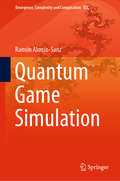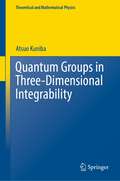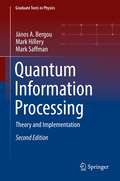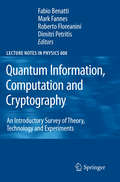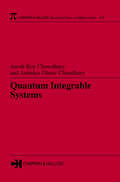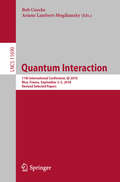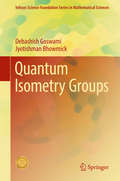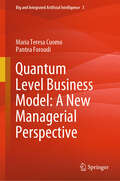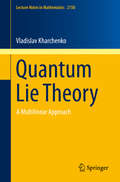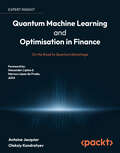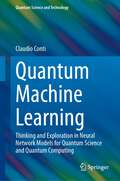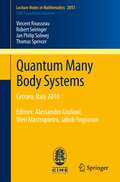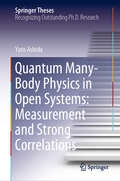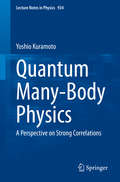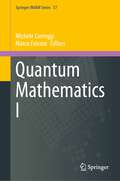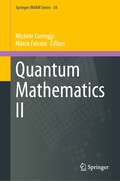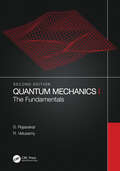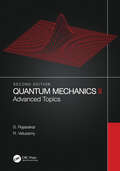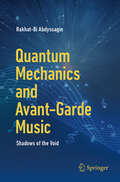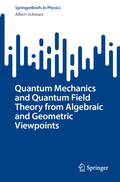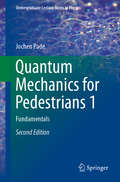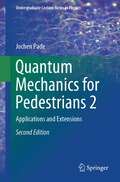- Table View
- List View
Quantum Game Simulation (Emergence, Complexity and Computation #36)
by Ramon Alonso-SanzThis book addresses two disciplines that have traditionally occupied completely different realms: quantum information and computation, and game theory. Helping readers connect these fields, it appeals to a wide audience, including computer scientists, engineers, mathematicians, physicists, biologists or economists. The book is richly illustrated and basic concepts are accessible to readers with basic training in science. As such it is useful for undergraduate students as well as established academicians and researchers. Further, the didactic and tutorial-like style makes it ideal supplementary reading for courses on quantum information and computation, game theory, cellular automata and simulation.
Quantum Gravity and the Functional Renormalization Group: The Road towards Asymptotic Safety (Cambridge Monographs on Mathematical Physics)
by Martin Reuter Frank SaueressigDuring the past two decades the gravitational asymptotic safety scenario has undergone a major transition from an exotic possibility to a serious contender for a realistic theory of quantum gravity. It aims at a mathematically consistent quantum description of the gravitational interaction and the geometry of spacetime within the realm of quantum field theory, which keeps its predictive power at the highest energies. This volume provides a self-contained pedagogical introduction to asymptotic safety, and introduces the functional renormalization group techniques used in its investigation, along with the requisite computational techniques. The foundational chapters are followed by an accessible summary of the results obtained so far. It is the first detailed exposition of asymptotic safety, providing a unique introduction to quantum gravity and it assumes no previous familiarity with the renormalization group. It serves as an important resource for both practising researchers and graduate students entering this maturing field.
Quantum Groups in Three-Dimensional Integrability (Theoretical and Mathematical Physics)
by Atsuo KunibaQuantum groups have been studied intensively in mathematics and have found many valuable applications in theoretical and mathematical physics since their discovery in the mid-1980s. Roughly speaking, there are two prototype examples of quantum groups, denoted by Uq and Aq. The former is a deformation of the universal enveloping algebra of a Kac–Moody Lie algebra, whereas the latter is a deformation of the coordinate ring of a Lie group. Although they are dual to each other in principle, most of the applications so far are based on Uq, and the main targets are solvable lattice models in 2-dimensions or quantum field theories in 1+1 dimensions. This book aims to present a unique approach to 3-dimensional integrability based on Aq. It starts from the tetrahedron equation, a 3-dimensional analogue of the Yang–Baxter equation, and its solution due to work by Kapranov–Voevodsky (1994). Then, it guides readers to its variety of generalizations, relations to quantum groups, and applications. They include a connection to the Poincaré–Birkhoff–Witt basis of a unipotent part of Uq, reductions to the solutions of the Yang–Baxter equation, reflection equation, G2 reflection equation, matrix product constructions of quantum R matrices and reflection K matrices, stationary measures of multi-species simple-exclusion processes, etc. These contents of the book are quite distinct from conventional approaches and will stimulate and enrich the theories of quantum groups and integrable systems.
Quantum Hamilton-Jacobi Formalism (SpringerBriefs in Physics)
by A. K. Kapoor Prasanta K. Panigrahi S. Sree RanjaniThis book describes the Hamilton-Jacobi formalism of quantum mechanics, which allowscomputation of eigenvalues of quantum mechanical potential problems without solving for thewave function. The examples presented include exotic potentials such as quasi-exactly solvablemodels and Lame an dassociated Lame potentials. A careful application of boundary conditionsoffers an insight into the nature of solutions of several potential models. Advancedundergraduates having knowledge of complex variables and quantum mechanics will find thisas an interesting method to obtain the eigenvalues and eigen-functions. The discussion oncomplex zeros of the wave function gives intriguing new results which are relevant foradvanced students and young researchers. Moreover, a few open problems in research arediscussed as well, which pose a challenge to the mathematically oriented readers.
Quantum Information Processing: Theory and Implementation (Graduate Texts in Physics)
by Mark Hillery János A. Bergou Mark SaffmanThis new edition of a well-received textbook provides a concise introduction to both the theoretical and experimental aspects of quantum information at the graduate level. While the previous edition focused on theory, the book now incorporates discussions of experimental platforms. Several chapters on experimental implementations of quantum information protocols have been added: implementations using neutral atoms, trapped ions, optics, and solidstate systems are each presented in its own chapter. Previous chapters on entanglement, quantum measurements, quantum dynamics, quantum cryptography, and quantum algorithms have been thoroughly updated, and new additions include chapters on the stabilizer formalism and the Gottesman-Knill theorem as well as aspects of classical and quantum information theory. To facilitate learning, each chapter starts with a clear motivation to the topic and closes with exercises and a recommended reading list. Quantum Information Processing: Theory and Implementation will be essential to graduate students studying quantum information as well as and researchers in other areas of physics who wish to gain knowledge in the field.
Quantum Information, Computation and Cryptography
by Fabio Benatti Dimitri Petritis Mark Fannes Roberto FloreaniniThis multi-authored textbook addresses graduate students with a background in physics, mathematics or computer science. No research experience is necessary. Consequently, rather than comprehensively reviewing the vast body of knowledge and literature gathered in the past twenty years, this book concentrates on a number of carefully selected aspects of quantum information theory and technology. Given the highly interdisciplinary nature of the subject, the multi-authored approach brings together different points of view from various renowned experts, providing a coherent picture of the subject matter. The book consists of ten chapters and includes examples, problems, and exercises. The first five present the mathematical tools required for a full comprehension of various aspects of quantum mechanics, classical information, and coding theory. Chapter 6 deals with the manipulation and transmission of information in the quantum realm. Chapters 7 and 8 discuss experimental implementations of quantum information ideas using photons and atoms. Finally, chapters 9 and 10 address ground-breaking applications in cryptography and computation.
Quantum Integrable Systems (Chapman And Hall/crc Research Notes In Mathematics Ser. #Vol. 435)
by Asesh Roy Chowdhury Aninlya Ghose ChoudhuryThe study of integrable systems has opened new horizons in classical physics over the past few decades, particularly in the subatomic world. Yet despite the field now having reached a level of maturity, very few books provide an introduction to the field accessible to specialists and nonspecialists alike, and none offer a systematic survey of the m
Quantum Interaction: 11th International Conference, QI 2018, Nice, France, September 3–5, 2018, Revised Selected Papers (Lecture Notes in Computer Science #11690)
by Bob Coecke Ariane Lambert-MogilianskyThis book constitutes the thoroughly refereed post-conference proceedings of the 10th International Conference on Quantum Interaction, QI 2018, held in Nice, France, in September 2018.The 12 papers presented in this book were carefully reviewed and selected from 15 submissions. The papers address topics such as: psychology, economics, semantic and memory, natural language processing, cognition, information retrieval, biology, and political science.
Quantum Isometry Groups
by Debashish Goswami Jyotishman BhowmickThis book offers an up-to-date overview of the recently proposed theory of quantum isometry groups. Written by the founders, it is the first book to present the research on the "quantum isometry group", highlighting the interaction of noncommutative geometry and quantum groups, which is a noncommutative generalization of the notion of group of isometry of a classical Riemannian manifold. The motivation for this generalization is the importance of isometry groups in both mathematics and physics. The framework consists of Alain Connes' "noncommutative geometry" and the operator-algebraic theory of "quantum groups". The authors prove the existence of quantum isometry group for noncommutative manifolds given by spectral triples under mild conditions and discuss a number of methods for computing them. One of the most striking and profound findings is the non-existence of non-classical quantum isometry groups for arbitrary classical connected compact manifolds and, by using this, the authors explicitly describe quantum isometry groups of most of the noncommutative manifolds studied in the literature. Some physical motivations and possible applications are also discussed.
Quantum Level Business Model: A New Managerial Perspective (Big and Integrated Artificial Intelligence #3)
by Pantea Foroudi Maria Teresa CuomoEmbracing complexity as an opportunity, this groundbreaking book introduces Quantum Level Management—an agile, probabilistic, and interconnected approach to business. By applying principles from Quantum Science, it offers a radically new framework for strategic planning, decision-making, and organizational design. A key contribution is its ambidextrous logic: the ability to balance structure with flexibility, control with creativity, and stability with innovation. A dedicated section explores real-world applications in financial markets, a critical arena for testing and advancing Quantum Technologies. With critical insights, practical tools, and compelling case studies, this book empowers students, scholars, executives, and entrepreneurs to navigate an uncertain and dynamic quantum environment.
Quantum Lie Theory
by Vladislav KharchenkoThis is an introduction to the mathematics behind the phrase "quantum Lie algebra". The numerous attempts over the last 15-20 years to define a quantum Lie algebra as an elegant algebraic object with a binary "quantum" Lie bracket have not been widely accepted. In this book, an alternative approach is developed that includes multivariable operations. Among the problems discussed are the following: a PBW-type theorem; quantum deformations of Kac--Moody algebras; generic and symmetric quantum Lie operations; the Nichols algebras; the Gurevich--Manin Lie algebras; and Shestakov--Umirbaev operations for the Lie theory of nonassociative products. Opening with an introduction for beginners and continuing as a textbook for graduate students in physics and mathematics, the book can also be used as a reference by more advanced readers. With the exception of the introductory chapter, the content of this monograph has not previously appeared in book form.
Quantum Machine Learning and Optimisation in Finance: On the Road to Quantum Advantage
by Antoine Jacquier Alexander Lipton Oleksiy Kondratyev Marcos Lopez PradoLearn the principles of quantum machine learning and how to apply them in finance.Purchase of the print or Kindle book includes a free eBook in the PDF format.Key FeaturesDiscover how to solve optimisation problems on quantum computers that can provide a speedup edge over classical methodsUse methods of analogue and digital quantum computing to build powerful generative modelsCreate the latest algorithms that work on Noisy Intermediate-Scale Quantum (NISQ) computersBook DescriptionWith recent advances in quantum computing technology, we finally reached the era of Noisy Intermediate-Scale Quantum (NISQ) computing. NISQ-era quantum computers are powerful enough to test quantum computing algorithms and solve hard real-world problems faster than classical hardware.Speedup is so important in financial applications, ranging from analysing huge amounts of customer data to high frequency trading. This is where quantum computing can give you the edge. Quantum Machine Learning and Optimisation in Finance shows you how to create hybrid quantum-classical machine learning and optimisation models that can harness the power of NISQ hardware.This book will take you through the real-world productive applications of quantum computing. The book explores the main quantum computing algorithms implementable on existing NISQ devices and highlights a range of financial applications that can benefit from this new quantum computing paradigm.This book will help you be one of the first in the finance industry to use quantum machine learning models to solve classically hard real-world problems. We may have moved past the point of quantum computing supremacy, but our quest for establishing quantum computing advantage has just begun!What you will learnTrain parameterised quantum circuits as generative models that excel on NISQ hardwareSolve hard optimisation problemsApply quantum boosting to financial applicationsLearn how the variational quantum eigensolver and the quantum approximate optimisation algorithms workAnalyse the latest algorithms from quantum kernels to quantum semidefinite programmingApply quantum neural networks to credit approvalsWho this book is forThis book is for Quants and developers, data scientists, researchers, and students in quantitative finance. Although the focus is on financial use cases, all the methods and techniques are transferable to other areas.
Quantum Machine Learning: Thinking and Exploration in Neural Network Models for Quantum Science and Quantum Computing (Quantum Science and Technology)
by Claudio ContiThis book presents a new way of thinking about quantum mechanics and machine learning by merging the two. Quantum mechanics and machine learning may seem theoretically disparate, but their link becomes clear through the density matrix operator which can be readily approximated by neural network models, permitting a formulation of quantum physics in which physical observables can be computed via neural networks. As well as demonstrating the natural affinity of quantum physics and machine learning, this viewpoint opens rich possibilities in terms of computation, efficient hardware, and scalability. One can also obtain trainable models to optimize applications and fine-tune theories, such as approximation of the ground state in many body systems, and boosting quantum circuits’ performance. The book begins with the introduction of programming tools and basic concepts of machine learning, with necessary background material from quantum mechanics and quantum information also provided. This enables the basic building blocks, neural network models for vacuum states, to be introduced. The highlights that follow include: non-classical state representations, with squeezers and beam splitters used to implement the primary layers for quantum computing; boson sampling with neural network models; an overview of available quantum computing platforms, their models, and their programming; and neural network models as a variational ansatz for many-body Hamiltonian ground states with applications to Ising machines and solitons. The book emphasizes coding, with many open source examples in Python and TensorFlow, while MATLAB and Mathematica routines clarify and validate proofs. This book is essential reading for graduate students and researchers who want to develop both the requisite physics and coding knowledge to understand the rich interplay of quantum mechanics and machine learning.
Quantum Many Body Systems
by Vieri Mastropietro Jakob Yngvason Vincent Rivasseau Jan Philip Solovej Thomas Spencer Alessandro Giuliani Robert SeiringerThe book is based on the lectures given at the CIME school "Quantum many body systems" held in the summer of 2010. It provides a tutorial introduction to recent advances in the mathematics of interacting systems, written by four leading experts in the field: V. Rivasseau illustrates the applications of constructive Quantum Field Theory to 2D interacting electrons and their relation to quantum gravity; R. Seiringer describes a proof of Bose-Einstein condensation in the Gross-Pitaevski limit and explains the effects of rotating traps and the emergence of lattices of quantized vortices; J.-P. Solovej gives an introduction to the theory of quantum Coulomb systems and to the functional analytic methods used to prove their thermodynamic stability; finally, T. Spencer explains the supersymmetric approach to Anderson localization and its relation to the theory of random matrices. All the lectures are characterized by their mathematical rigor combined with physical insights.
Quantum Many-Body Physics in Open Systems: Measurement and Strong Correlations (Springer Theses)
by Yuto AshidaThis book studies the fundamental aspects of many-body physics in quantum systems open to an external world. Recent remarkable developments in the observation and manipulation of quantum matter at the single-quantum level point to a new research area of open many-body systems, where interactions with an external observer and the environment play a major role. The first part of the book elucidates the influence of measurement backaction from an external observer, revealing new types of quantum critical phenomena and out-of-equilibrium dynamics beyond the conventional paradigm of closed systems. In turn, the second part develops a powerful theoretical approach to study the in- and out-of-equilibrium physics of an open quantum system strongly correlated with an external environment, where the entanglement between the system and the environment plays an essential role. The results obtained here offer essential theoretical results for understanding the many-body physics of quantum systems open to an external world, and can be applied to experimental systems in atomic, molecular and optical physics, quantum information science and condensed matter physics.
Quantum Many-Body Physics: A Perspective on Strong Correlations (Lecture Notes in Physics #934)
by Yoshio KuramotoThis book offers a compact tutorial on basic concepts and tools in quantum many-body physics, and focuses on the correlation effects produced by mutual interactions.The content is divided into three parts, the first of which introduces readers to perturbation theory. It begins with the simplest examples—hydrogen and oxygen molecules—based on their effective Hamiltonians, and looks into basic properties of electrons in solids from the perspective of localized and itinerant limits. Readers will also learn about basic theoretical methods such as the linear response theory and Green functions. The second part focuses on mean-field theory for itinerant electrons, e.g. the Fermi liquid theory and superconductivity. Coulomb repulsion among electrons is addressed in the context of high-Tc superconductivity in cuprates and iron pnictides. A recent discovery concerning hydride superconductors is also briefly reviewed. In turn, the third part highlights quantum fluctuation effects beyond the mean-field picture. Discussing the dramatic renormalization effect in the Kondo physics, it provides a clear understanding of nonperturbative interaction effects. Further it introduces readers to fractionally charged quasi-particles in one and two dimensions. The last chapter addresses the dynamical mean field theory (DMFT).The book is based on the author’s long years of experience as a lecturer and researcher. It also includes reviews of recent focus topics in condensed matter physics, enabling readers to not only grasp conventional condensed matter theories but also to catch up on the latest developments in the field.
Quantum Mathematical Physics
by Felix Finster Johannes Kleiner Christian Röken Jürgen TolksdorfQuantum physics has been highly successful for more than 90 years. Nevertheless, a rigorous construction of interacting quantum field theory is still missing. Moreover, it is still unclear how to combine quantum physics and general relativity in a unified physical theory. Attacking these challenging problems of contemporary physics requires highly advanced mathematical methods as well as radically new physical concepts. This book presents different physical ideas and mathematical approaches in this direction. It contains a carefully selected cross-section of lectures which took place in autumn 2014 at the sixth conference ``Quantum Mathematical Physics - A Bridge between Mathematics and Physics'' in Regensburg, Germany. In the tradition of the other proceedings covering this series of conferences, a special feature of this book is the exposition of a wide variety of approaches, with the intention to facilitate a comparison. The book is mainly addressed to mathematicians and physicists who are interested in fundamental questions of mathematical physics. It allows the reader to obtain a broad and up-to-date overview of a fascinating active research area.
Quantum Mathematics I (Springer INdAM Series #57)
by Michele Correggi Marco FalconiThis book is the first volume that provides an unique overview of the most recent and relevant contributions in the field of mathematical physics with a focus on the mathematical features of quantum mechanics. It is a collection of review papers together with brand new works related to the activities of the INdAM Intensive Period "INdAM Quantum Meetings (IQM22)", which took place at the Politecnico di Milano in Spring 2022 at Politecnico di Milano. The range of topics covered by the book is wide, going ranging from many-body quantum mechanics to semiclassical analysis, quantum field theory, Schrödinger and Dirac operators and open quantum systems
Quantum Mathematics II (Springer INdAM Series #58)
by Michele Correggi Marco FalconiThis book is the second volume that provides an unique overview of the most recent and relevant contributions in the field of mathematical physics with a focus on the mathematical features of quantum mechanics. It is a collection of review papers together with brand new works related to the activities of the INdAM Intensive Period "INdAM Quantum Meetings (IQM22)", which took place at the Politecnico di Milano in Spring 2022 at Politecnico di Milano. The range of topics covered by the book is wide, going ranging from many-body quantum mechanics to quantum field theory and open quantum systems.
Quantum Mechanics I: The Fundamentals
by S. Rajasekar R. VelusamyQuantum Mechanics I: The Fundamentals provides a graduate-level account of the behavior of matter and energy at the molecular, atomic, nuclear, and sub-nuclear levels. It covers basic concepts, mathematical formalism, and applications to physically important systems. This fully updated new edition addresses many topics not typically found in books at this level, including: Bound state solutions of quantum pendulum Morse oscillator Solutions of classical counterpart of quantum mechanical systems A criterion for bound state Scattering from a locally periodic potential and reflection-less potential Modified Heisenberg relation Wave packet revival and its dynamics An asymptotic method for slowly varying potentials Klein paradox, Einstein-Podolsky-Rosen (EPR) paradox, and Bell’s theorem Delayed-choice experiments Fractional quantum mechanics Numerical methods for quantum systems A collection of problems at the end of each chapter develops students’ understanding of both basic concepts and the application of theory to various physically important systems. This book, along with the authors’ follow-up Quantum Mechanics II: Advanced Topics, provides students with a broad, up-to-date introduction to quantum mechanics. Print Versions of this book also include access to the ebook version.
Quantum Mechanics II: Advanced Topics
by S. Rajasekar R. VelusamyQuantum Mechanics II: Advanced Topics offers a comprehensive exploration of the state-of-the-art in various advanced topics of current research interest. A follow-up to the authors’ introductory book Quantum Mechanics I: The Fundamentals, this book expounds basic principles, theoretical treatment, case studies, worked-out examples and applications of advanced topics including quantum technologies. A thoroughly revised and updated this unique volume presents an in-depth and up-to-date progress on the growing topics including latest achievements on quantum technology. In the second edition six new chapters are included and the other ten chapters are extensively revised. Features Covers classical and quantum field theories, path integral formalism and supersymmetric quantum mechanics. Highlights coherent and squeezed states, Berry’s phase, Aharonov—Bohm effect and Wigner function. Explores salient features of quantum entanglement and quantum cryptography. Presents basic concepts of quantum computers and the features of no-cloning theorem and quantum cloning machines. Describes the theory and techniques of quantum tomography, quantum simulation and quantum error correction. Introduces other novel topics including quantum versions of theory of gravity, cosmology, Zeno effect, teleportation, games, chaos and steering. Outlines the quantum technologies of ghost imaging, detection of weak amplitudes and displacements, lithography, metrology, teleportation of optical images, sensors, batteries and internet. Contains several worked-out problems and exercises in each chapter. Quantum Mechanics II: Advanced Topics addresses various currently emerging exciting topics of quantum mechanics. It emphasizes the fundamentals behind the latest cutting-edge developments to help explain the motivation for deeper exploration. The book is a valuable resource for graduate students in physics and engineering wishing to pursue research in quantum mechanics.
Quantum Mechanics and Avant-Garde Music: Shadows of the Void
by Rakhat-Bi Abdyssagin"Fascinating details and anecdotes accompany this engaging account of the emergence of dramatic new ideas and forms in music over the centuries..." David Politzer, winner of the 2004 Nobel Prize in Physics. "A thought-provoking, stimulating, and highly original exploration of deep metaphorical links between music and physics...Highly recommended." Prof. Ian Stewart FRS, author, What’s the Use? "An astonishing book!" Tristan Murail, composer and co-creator of the "spectral" technique. Have you ever wondered about the connection between Pauli's exclusion principle and Schoenberg's dodecaphony? Or the symphonic echoes of Heisenberg's uncertainty principle in the compositions of Stockhausen and Cage? This book not only poses these questions but skillfully uncovers the artistic answers, exploring interdisciplinary connections that bridge the gap between modern physics and contemporary music. Dive into philosophical discourses on time, witness the metamorphosis of Boolean algebra, bits, and qubits into musical notation, and discover the limitations of the 12-tone scale mirrored in the speed of light. The author's unique methodology offers a fresh perspective, linking the language of mathematics and physics to the creation of musical scores. This book transcends the boundaries of physics and music, revealing the inevitable fusion of modern physics and avant-garde music in the twentieth century. Through meticulous research, the author showcases the profound impact of revolutionary ideas such as quantum physics and relativity on all aspects of life and demonstrates that modern physics and contemporary music were born not out of chance—their emergence and development were inevitable events. Delving into the historical accounts, he explores the musical endeavors of great physicists like Max Planck and Albert Einstein, unraveling the quantum entanglement of physics mirrored in the extended techniques of contemporary music and unveiling the musical universe of Werner Heisenberg through captivating personal encounters with his descendants. Crafted for general readers and seasoned experts alike, the book maintains clarity and style, ensuring accessibility without sacrificing depth. This pioneering exploration not only draws connections between modern physics and music but also serves as a unique bridge for scientists, musicians, and the curious general audience. Requiring no formal background in physics or music, the book is a compelling read for those intrigued by the uncharted territories where science and art converge, offering a concise and illuminating journey into the shadows of the void.
Quantum Mechanics and Quantum Field Theory from Algebraic and Geometric Viewpoints (SpringerBriefs in Physics)
by Albert SchwarzThis book offers a non-standard introduction to quantum mechanics and quantum field theory, approaching these topics from algebraic and geometric perspectives. Beginning with fundamental notions of quantum theory and the derivation of quantum probabilities from decoherence, it proceeds to prove the expression for the scattering matrix in terms of Green functions (LSZ formula), along with a similar expression for the inclusive scattering matrix. The exposition relies on recent findings by the author that provide a deeper understanding of the structure of quantum theory and extend beyond its traditional boundaries. The book is suitable for graduate students and young researchers in mathematics and theoretical physics seeking to delve into innovative concepts within quantum theory. The book contains many recent results therefore it should be interesting also to accomplished physicists and mathematicians.
Quantum Mechanics for Pedestrians 1: Fundamentals (Undergraduate Lecture Notes in Physics)
by Jochen PadeThis book, the first in a two-volume set, provides an introduction to the fundamentals of (mainly) non-relativistic quantum mechanics. This first volume chiefly focuses on the essential principles, while applications and extensions of the formalism can be found in volume 2. Including but also moving beyond material that is covered in traditional textbooks on quantum mechanics, the book discusses in detail current issues such as interaction-free quantum measurements or neutrino oscillations, as well as fundamental problems and epistemological questions, such as the measurement problem. A chapter on the postulates of quantum mechanics rounds off this first volume. In order to quickly and clearly present the main principles of quantum mechanics and its mathematical formulation, there is a systematic transition between wave mechanics and algebraic representation in the first few chapters, in which the required mathematical tools are introduced step by step. Moreover, the appendix concisely reviews the most important mathematical tools, allowing readers to largely dispense with supplementary literature. The appendix also explores advanced topics, such as the Quantum-Zeno effect and time-delay experiments. Over 250 exercises, most of them with solutions, help to deepen the reader’s understanding of the topics discussed. This revised second edition is expanded by an introduction to some ideas and problems of relativistic quantum mechanics. In this first volume, the Klein-Gordon and the Dirac equations are treated. Fundamentals of other areas are compiled in compact form, i.e., outlines of special relativity, classical field theory and electrodynamics. The book is chiefly intended for student science teachers and all students of physics, majors and minors alike, who are looking for a reasonably easy and modern introduction to quantum mechanics.
Quantum Mechanics for Pedestrians 2: Applications and Extensions (Undergraduate Lecture Notes in Physics)
by Jochen PadeThis book, the second in a two-volume set, provides an introduction to the basics of (mainly) non-relativistic quantum mechanics. While the first volume addresses the basic principles, this second volume discusses applications and extensions to more complex problems. In addition to topics dealt with in traditional quantum mechanics texts, such as symmetries or many-body problems, it also treats issues of current interest such as entanglement, Bell’s inequality, decoherence and various aspects of quantum information in detail. Furthermore, questions concerning the basis of quantum mechanics and epistemological issues which are relevant e.g. to the realism debate are discussed explicitly. A chapter on the interpretations of quantum mechanics rounds out the book. Readers are introduced to the requisite mathematical tools step by step. In the appendix, the most relevant mathematics is compiled in compact form, and more advanced topics such as the Lenz vector, Hardy’s experiment and Shor’s algorithm are treated in more detail. As an essential aid to learning and teaching, 130 exercises are included, most of them with solutions. This revised second edition is expanded by an introduction into some ideas and problems of relativistic quantum mechanics. In this second volume, an overview of quantum field theory is given and basic conceptions of quantum electrodynamics are treated in some detail. Originally written as a course for students of science education, the book addresses all those science students and others who are looking for a reasonably simple, fresh and modern introduction to the field.
